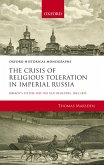A Prison Without Walls? presents a snapshot of daily life for exiles and their dependents in eastern Siberia during the very last years of the Tsarist regime, from the 1905 revolution to the collapse of the Tsarist regime in 1917. This was an extraordinary period in Siberia's history as a place of punishment. There was an unprecedented rise of Siberia's penal use in this fifteen-year window, and a dramatic increase in the number of exiles punished for political offences. This work focuses on the region of Eastern Siberia, taking the regions of Irkutsk and Yakutsk in north-eastern Siberia as its focal points. Siberian exile was the antithesis of Foucault's modern prison. The State did not observe, monitor, and control its exiles closely; often not even knowing where the exiles were. Exiles were free to govern their daily lives; free of fences and free from close observation and supervision, but despite these freedoms, Siberian exile represented one of Russia's most feared punishments. In this volume, Sarah Badcock seeks to humanise the individuals who made up the mass of exiles, and the men, women, and children who followed them voluntarily into exile. A Prison Without Walls? is structured in a broad narrative arc that moves from travel to exile, life and communities in exile, work and escape, and finally illness in exile. The book gives a personal, human, empathetic insight into what exilic experience entailed, and allows us to comprehend why eastern Siberia was regarded as a terrible punishment, despite its apparent freedoms.
Dieser Download kann aus rechtlichen Gründen nur mit Rechnungsadresse in A, B, BG, CY, CZ, D, DK, EW, E, FIN, F, GR, HR, H, IRL, I, LT, L, LR, M, NL, PL, P, R, S, SLO, SK ausgeliefert werden.









